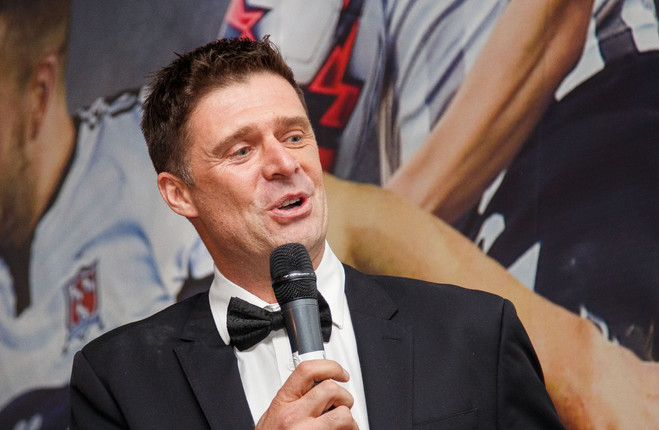THE FAI REVIEW and analysis of football in Ireland, authored by former League of Ireland player Kieran Foley and backed by ex-international Niall Quinn, was unveiled during an event in Dublin’s Mansion House today.
You can read the report in full here, but some of its key points are summarised below.
1. Need for reform
‘Transparency’ is a word that was often used by former FAI CEO John Delaney, so simply saying it doesn’t necessarily make it so. However, the review does at least recognise the need for serious reform within the FAI. It highlights the need to “address weaknesses in the governance structure of the FAI Board,” adding: “We have a clear plan on how to ensure stronger, more efficient governance, characterised by enhanced transparency and accountability and greater commercial awareness and innovation at all levels.”
2. Player development
For years, it has been apparent that the model of developing players in Ireland is flawed. The League of Ireland has been neglected, while there has been an over-reliance on English-based clubs to develop players.
Part of the report reads: “The area of Player Development is critical and core to the success of football in Ireland. The development of our players at a senior international level has been for too long over reliant on the inclusion and integration to the English club level and to seek to be a part of the higher echelons of that league while watching the demise of our own national league and the habitual floundering of the many thousands of young aspiring Irish players who leave these shores at a young age, pre finalising their own education in the hopes of “making it”, only to realise there is no structure which properly supports them or provides for them should they not make it in a non-domestic league in Ireland.
“With domestic media deals inflating the value of clubs in England so that Everton are
now wealthier than AC Milan, tells its own story that players from Ireland can no longer
seek to develop their talents abroad as they face multi-million dollar talent opposition for
places at underage levels, not to mention the tens of millions now paid for first team
players. This simply furthers our own resolve to grow our own pathways, as while the
English Premier League have their domestic media deals, we in Ireland have a partnership with Europe and are home to some of the largest multinationals and corporations the planet has ever seen.
“The resources available to the FAI need to be developed but a compelling and stronger
argument needs to be constructed to ensure the funds and partnerships are properly
provided.”
3. Issues at board level
The previous FAI board was criticised for the lack of term limits and long-term absence of any female representation until 2017. The review promises to rectify these problems, with a “mandatory minimum of one female board member,” a “dedicated board member with responsibility for women’s game” and a “maximum age for board members”.
4. Development of club academies
With the exception of a handful of clubs, there are no proper academies in Irish football currently. Football is not an industry in this country like it is in England and elsewhere. As part of the development of “better players and coaches,” the review’s recommendations include:
- Stronger links with provinces and schools and universities ensuring we increase access to high quality coaching for children in school education.
- Widen coaches participation and removal of some financial burdens to develop.
- Develop club academies and providing opportunities in the game for players who leave professional football.
5. Marketing
Irish football and in particular the League of Ireland and the Women’s National League suffer from a lack of marketing. The review acknowledges the need for a “highly effective sports facility management that attracts sponsors, drives revenue and promotes the facility within the community and beyond”. The report later adds:
“As we look to substantially grow the development of the game, both socially, brand
development through marketing, professionally with a league, breaking diversity with more programmes with inclusion initiatives and gender equality, there is more access to open discussions with Government and local councils to ensure the provision and venues specific for football development”.
Ultimately the review notes the need to “create sustainable revenue and marketing programmes in each region of Irish football by 2023 and ensure a more robust commercial model in place”.
6. Developing referees
An often overlooked issue, the appalling treatment of referees, particularly at grassroots level, has been well documented, to the extent that some are leaving the game, with feelings of disillusionment rife. The reviews recommends implementing “referee structure, training, support and pathway to pro league” and “to correlate to player development with specific coaching and analysis”. It also focuses on the need to “develop Elite Academy programming to increase the number of Fifa referees listed for international duty (currently 4 referees with a total of 15 officials)” and to “programme full time referees into the National League who will have more responsibility to develop the programming and increase the awareness, profile and participation as referees”.
7. To undertake an “immediate and complete transformation” of the League of Ireland
Famously described as Irish football’s “problem child” by John Delaney, there have been countless reports and suggestions on how to ‘fix’ the League of Ireland, and this latest review is no different. One important point made is the need for “a clear distribution of centralised funds as well as team revenue opportunities”. The review adds: “The visionary group would propose a new structure from the current framework in that the League would become an independent commercial body but play under the official regulations and statutes of the FAI, under Uefa and Fifa rules, but run independently commercially by a third party e.g. English Premier League structure.”
8. Better promotion of women’s football
A very broad area but one important area that the report hones in on is the need for “the involvement of women on governing bodies and in management. In principle, the FAI should have women involved at all decision-making levels, including the Executive Committee.” The requirement for an improvement in the marketing of the women’s game is also highlighted, as is the need to incorporate those with expertise in the area, such as former players, to provide assistance. Among the key objectives are to qualify for the FIFA Women’s World Cup by 2027, to double the number of female players by 2026 and to “raise the standards of women’s football clubs and leagues across all clubs and provinces”.
9. Improve facilities
Strong facilities and infrastructure are the bedrock of any sport and the report acknowledges this issue, noting:
“The key aspect for any development of the game will live or die based on the access, use of and ultimate ownership of proper and efficient facilities and a strong effective infrastructure overall.
“The professional game, player pathway programmes, club participation, school systems, and even increased amateur participation, all depend on our ability as a country to develop the proper facilities that properly support the development of the game, but as importantly, they need to be built as self-sufficient commercial properties with efficient management structures in place to keep them viable and growing.
“While the playing surface will always need to be paramount, the effects of our weather and climate patterns needs to be accounted for, as well as the proper floodlighting, facilities, car parking space, changing rooms and capacity to ensure we can take advantage of the many programmes we need to develop.”
10. Results
One of the most fascinating and ambitious elements of the review, the objectives include:
- A new Governance structure adopted by the FAI by the end of 2019 and a new structure to come into effect.
- Increase participation in football by 7 ½ % year on year from 2020
- Create a viable and profitable League of Ireland by 2026
- Have one league of Ireland Team qualify for the group stages of the UEFA Champions League by 2027.
- Qualify for the FIFA Men’s World Cup competition by 2026 and the European Championships by 2028 and the FIFA Women’s World Cup by 2027
- Win an underage European Championship by 2032
- Qualify for the semi-finals of the FIFA World Cup in 2038
Gavan Casey is joined by Murray Kinsella and Sean Farrell for a review of the 2018/19 season, and cast an eye forward to next year and the Rugby World Cup in Japan.:
The42 Rugby Weekly / SoundCloud
Subscribe to our new podcast, The42 Rugby Weekly, here:


